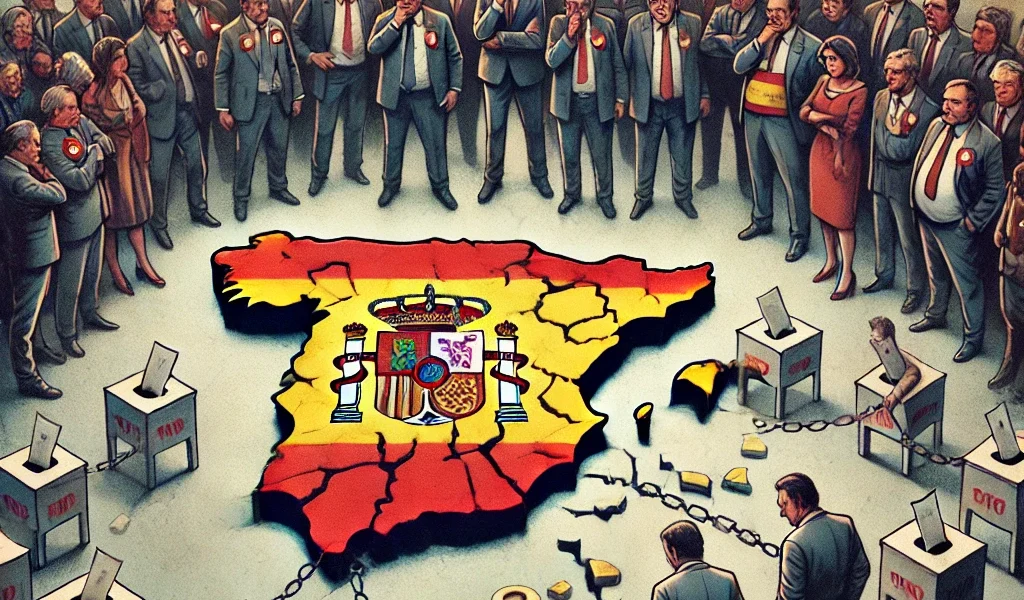Spain finds itself in a state of political uncertainty following an inconclusive national election that has left the country without a clear governing majority. As political parties scramble to form alliances and negotiate coalitions, the country faces an extended period of instability, with significant implications for its economy, policy-making, and international standing.
A Divided Political Landscape
The election, held amid widespread discontent over economic inequality, regional tensions, and political corruption, resulted in a fragmented outcome that reflects the deep divides in Spanish society. Neither the center-left Socialist Workers’ Party (PSOE), led by Prime Minister Pedro Sánchez, nor the center-right People’s Party (PP), led by Alberto Núñez Feijóo, won a decisive mandate to govern.
PSOE gained a significant portion of the vote but fell short of securing the seats needed for an outright majority in the 350-member Congress of Deputies. Meanwhile, the PP, buoyed by a surge in support from voters frustrated with Sánchez’s leadership, also came up short of a parliamentary majority.
The Role of Regional and Smaller Parties
Spain’s electoral system allows smaller regional parties, many of which represent specific communities such as Catalonia or the Basque Country, to hold substantial influence in the formation of a government. With both major parties failing to secure a majority, these smaller parties are now in a position of power, potentially becoming kingmakers in the ongoing negotiations.
The pro-independence Catalan parties, in particular, are set to play a crucial role. They have made clear that their support comes with a price: further autonomy for Catalonia or a referendum on independence. The political challenge for both PSOE and PP is navigating these demands without alienating other regions or exacerbating Spain’s long-standing territorial tensions.
Uncertainty in Coalition Building
The political deadlock has raised questions about whether Spain will be able to avoid another round of elections. Prime Minister Sánchez has expressed his willingness to form a progressive coalition but faces significant hurdles in uniting the various left-leaning and regional forces required to secure a majority.
Meanwhile, the PP has its own challenges. While it seeks to build a conservative coalition, it may be forced to align with the far-right party Vox, a move that could prove controversial both domestically and internationally. Vox’s hardline stance on issues such as immigration and Catalan independence could alienate moderate voters and complicate negotiations with regional parties.
Economic Implications
Spain’s economic situation is precarious, and prolonged political uncertainty could exacerbate existing problems. The country is grappling with inflation, unemployment, and a slow post-pandemic recovery. Business confidence has already been shaken by the uncertain election outcome, with many fearing that a lack of clear leadership could lead to delays in critical economic reforms and investment decisions.
International investors and European Union officials are closely watching the situation in Spain, given the country’s role as one of the largest economies in the eurozone. Any prolonged period of instability could undermine Spain’s ability to meet EU targets, particularly in terms of budgetary discipline and the implementation of the European Green Deal.
The Future of Spanish Politics
This election marks yet another chapter in Spain’s evolving political landscape, which has seen a shift away from the traditional two-party dominance of PSOE and PP. The rise of regional and populist parties has fractured the political spectrum, making it increasingly difficult for any one party to govern alone.
Spain has already experienced multiple elections in quick succession over the past decade, and there is a growing sense of voter fatigue. If the current political deadlock leads to yet another election, it could further erode public trust in the political system and deepen the divisions within the country.
Potential Scenarios Ahead
As Spain’s political leaders engage in delicate negotiations to form a government, several scenarios could unfold:
- A Left-Wing Coalition: Sánchez could succeed in forming a coalition with smaller left-wing parties and regional groups. However, this would likely require significant concessions to the Catalan independence movement, which could provoke backlash from other regions and factions within Spain.
- A Right-Wing Coalition: The PP could attempt to form a government with Vox and other conservative forces, though this would likely be polarizing and could trigger protests from more liberal regions like Catalonia and the Basque Country.
- New Elections: If no coalition can be formed, Spain could be forced to return to the polls, further prolonging the uncertainty. A new election could produce a similar result, leaving Spain in a continued political quagmire.
- Minority Government: It is also possible that either PSOE or PP could attempt to govern with a minority government, seeking support on a vote-by-vote basis. This, however, would lead to a fragile and unstable government that struggles to pass legislation.
Conclusion
Spain’s inconclusive election has thrust the country into a political muddle, with no easy path forward. As parties negotiate behind the scenes and jockey for power, the country faces an uncertain future. Whether Spain can emerge from this crisis with a stable government remains to be seen, but one thing is clear: the road ahead is fraught with political, economic, and social challenges.




